The purpose of this study was to validate PCDS which measures perceived parental psychological control by adolescents. PCDS designed to focus on the essence of psychological control, which make children feel disrespected by parents. The results from 4...
http://chineseinput.net/에서 pinyin(병음)방식으로 중국어를 변환할 수 있습니다.
변환된 중국어를 복사하여 사용하시면 됩니다.
- 中文 을 입력하시려면 zhongwen을 입력하시고 space를누르시면됩니다.
- 北京 을 입력하시려면 beijing을 입력하시고 space를 누르시면 됩니다.
https://www.riss.kr/link?id=A106334244
- 저자
- 발행기관
- 학술지명
- 권호사항
-
발행연도
2019
-
작성언어
Korean
- 주제어
-
KDC
370
-
등재정보
KCI등재후보
-
자료형태
학술저널
- 발행기관 URL
-
수록면
15-37(23쪽)
-
KCI 피인용횟수
0
- DOI식별코드
- 제공처
-
0
상세조회 -
0
다운로드
부가정보
다국어 초록 (Multilingual Abstract)
The purpose of this study was to validate PCDS which measures perceived parental psychological control by adolescents. PCDS designed to focus on the essence of psychological control, which make children feel disrespected by parents. The results from 418 adolescents in high schools revealed as follows. The reliability was good and single factor structure was appropriate. The convergent and discrimination validity was verified by examining correlations with parental support and behaviour control. The criterion-related validity was also verified by examining correlation with conventional psychological control scale(PCS) and regressions with youth outcomes(Depression, Antisocial behaviour, Self-esteem, Self-worth and Self-derogation). Additionally, the present study was told that PCDS generally accounted for more and unique variance in youth outcomes than PCS in hierarchical multiple regression analysis. These results implicated that PCDS is more appropriate to measure the essence of psychological control than traditional scales. The limitations of this study and the suggestions for future research are discussed.
국문 초록 (Abstract)
본 연구는 Barber(1996)가 개발한 부모의 심리적 통제 척도를 2012년에 개정한 Psychological Control-Disrespect Scale(PCDS)을 한국어로 번안 및 타당화하는데 목적이 있다. 이 척도는 “자녀의 개성을 무시...
본 연구는 Barber(1996)가 개발한 부모의 심리적 통제 척도를 2012년에 개정한 Psychological Control-Disrespect Scale(PCDS)을 한국어로 번안 및 타당화하는데 목적이 있다. 이 척도는 “자녀의 개성을 무시”하는 심리적 통제의 본질에 중점을 두고 있다. 이를 위해 전국의 고등학생 418명의 자료를 바탕으로, PCDS의 신뢰도(Cronbach’s α), 확인적 요인분석, 구성타당도, 준거 타당도를 검증하였으며, 더 나아가 PCDS와 기존 심리적 통제(PCS)의 결과 변인(우울, 반사회적 행동, 자아존중감, 자기가치 및 자기비하)에 대한 예측을 비교하였다. PCDS는 높은 내적 합치도를 보였으며, 확인적 요인분석을 통해 단일요인구조를 확인하였다. 다음으로 부모의 지지, 부모의 행동적 통제와의 상관관계를 통해 PCDS의 구성타당도를 확인하였다. 기존 심리적 통제(PCS), 자녀의 결과변인을 통해 준거 타당도 또한 확인하였다. 추가적으로 청소년 자녀의 결과변인에 대한 PCDS와 기존 척도 PCS의 예측력을 비교한 결과, 전반적으로 PCDS가 PCS와는 달리 고유의 설명량을 갖는, 의미있는 척도임을 확인하였다. 이러한 결과들은, 기존 척도의 한계점을 보완하기 위해 고안된 PCDS가 청소년 자녀가 지각한 심리적 통제의 본질을 측정하기에 더 적합함을 시사한다. 마지막으로 본 연구의 제한점 및 추후 연구에 대한 제언에 대해 논의하였다.
참고문헌 (Reference)
1 전겸구, "통합적 한국판 CES-D 개발" 6 (6): 59-76, 2001
2 최정아, "청소년의 우울과 지각된 부모 지지, 행동적 통제 및 심리적 통제 간의 관계에 관한 연구 : 자아통제력 및 자아유능감의 매개효과를 중심으로" 한국청소년정책연구원 19 (19): 295-326, 2008
3 최순자, "유아를 둔 한국과 일본 부모의 양육태도 비교" 한국일본교육학회 12 (12): 111-130, 2007
4 김현아, "아버지의 심리적 통제 및 애착이 자녀의 공격성에 미치는 영향: 자녀 정서조절의 매개효과" 한국심리학회 산하 한국발달심리학회 29 (29): 253-275, 2016
5 정윤주, "아동이 지각한 어머니의 심리통제와 아동의 행동문제-아동의 성과 또래수용도의 중재효과에 대한 탐색-" 한국아동학회 25 (25): 205-224, 2004
6 최명진, "심리적 통제와 안녕감의 관계에서 갈등적 독립의 매개효과 검증" 아주대학교 대학원 2010
7 조은주, "부와 모의 심리적 통제와 청소년의 우울 및 불안 : 비합리적 신념의 매개역할" 한국청소년정책연구원 24 (24): 35-70, 2013
8 박성연, "부모의 심리적 통제유형이 청소년의 의존심, 자아비난 및 우울에 미치는 영향" 한국아동학회 29 (29): 65-78, 2008
9 김혜인, "부모의 심리적 통제와 고등학생의 역기능적 완벽주의 및 자의식 정서가 우울에 미치는 영향" 한국아동학회 32 (32): 15-36, 2011
10 이은경, "부모의 심리적 통제가 청소년의 우울성향 및 우울과 자아존중감에 미치는 영향" 한국아동학회 31 (31): 87-106, 2010
1 전겸구, "통합적 한국판 CES-D 개발" 6 (6): 59-76, 2001
2 최정아, "청소년의 우울과 지각된 부모 지지, 행동적 통제 및 심리적 통제 간의 관계에 관한 연구 : 자아통제력 및 자아유능감의 매개효과를 중심으로" 한국청소년정책연구원 19 (19): 295-326, 2008
3 최순자, "유아를 둔 한국과 일본 부모의 양육태도 비교" 한국일본교육학회 12 (12): 111-130, 2007
4 김현아, "아버지의 심리적 통제 및 애착이 자녀의 공격성에 미치는 영향: 자녀 정서조절의 매개효과" 한국심리학회 산하 한국발달심리학회 29 (29): 253-275, 2016
5 정윤주, "아동이 지각한 어머니의 심리통제와 아동의 행동문제-아동의 성과 또래수용도의 중재효과에 대한 탐색-" 한국아동학회 25 (25): 205-224, 2004
6 최명진, "심리적 통제와 안녕감의 관계에서 갈등적 독립의 매개효과 검증" 아주대학교 대학원 2010
7 조은주, "부와 모의 심리적 통제와 청소년의 우울 및 불안 : 비합리적 신념의 매개역할" 한국청소년정책연구원 24 (24): 35-70, 2013
8 박성연, "부모의 심리적 통제유형이 청소년의 의존심, 자아비난 및 우울에 미치는 영향" 한국아동학회 29 (29): 65-78, 2008
9 김혜인, "부모의 심리적 통제와 고등학생의 역기능적 완벽주의 및 자의식 정서가 우울에 미치는 영향" 한국아동학회 32 (32): 15-36, 2011
10 이은경, "부모의 심리적 통제가 청소년의 우울성향 및 우울과 자아존중감에 미치는 영향" 한국아동학회 31 (31): 87-106, 2010
11 안명희, "모의 심리적 통제와 청소년 우울: 모-자녀 관계만족도, 분노, 외로움의 매개효과" 한국상담심리학회 26 (26): 737-758, 2014
12 홍세희, "구조 방정식 모형의 적합도 지수선정기준과 그 근거" 19 (19): 161-177, 2000
13 Soenens, B., "Towards a domain-specific approach to the study of parental psychological control : distinguishing between dependency-oriented and achievement-oriented psychological control" 78 : 217-256, 2010
14 Rohner, R. P., "The warmth dimension: Foundations of parental acceptance-rejection theory" Sage 1986
15 Bean, R. A., "The impact of parental support, behavioral control, and psychological control on the academic achievement and self-esteem of African American and European American adolescents" 18 (18): 523-541, 2003
16 Lamb, M. E., "The history of research on father involvement: An overview" 29 (29): 23-42, 2000
17 Brooks-Gunn, J., "The contribution of parenting to ethnic and racial gaps in school readiness" 15 : 139-168, 2007
18 Browne, M. W., "Testing structural equation models" Sage 136-162, 1993
19 Rosenberg, M., "Society and the adolescent self-image" Princeton university press 1965
20 이자영, "Rosenberg의 자아존중감 척도: 문항수준 타당도분석" 한국상담심리학회 21 (21): 173-189, 2009
21 Rollins, B. C., "Research based theories. Contemporary theories about the family, Vol. 1" Free Press 1979
22 Khaleque, A., "Reliability of measures assessing the pancultural association between perceived parental acceptance-rejection and psychological adjustment : A meta-analysis of cross-cultural and intracultural studies" 33 : 87-99, 2002
23 Kline, R. B., "Principles and Practice of Structural Equation Modeling" Guilford Press 2010
24 MacCallum, R. C., "Power analysis and determination of sample size for covariance structure modeling" 1 : 130-149, 1996
25 Roman, N. V., "Perceptions of parenting styles in South Africa : The effects of gender and ethnicity" 3 (3): 1153231-, 2016
26 Rohner, R. P., "Perceived parental acceptance-rejection and parental control among Korean adolescents" 524-528, 1985
27 Smetana, J. G., "Parenting styles and conceptions of parental authority during adolescence" 66 : 299-316, 1995
28 Brown, B. B., "Parenting practices and peer group affiliation in adolescence" 64 (64): 467-482, 1993
29 Plunkett, S. W., "Parenting and adolescent self-esteem in Latino intact families, stepfather families, and single-mother families" 47 (47): 1-20, 2007
30 Barber, B. K., "Parental support, psychological control, and behavioral control : assessing relevance across time, method, and culture" 70 (70): 1-137, 2005
31 Cui, L., "Parental psychological control and adolescent adjustment : The role of adolescent emotion regulation" 14 (14): 47-67, 2014
32 Barber, B. K., "Parental psychological control : revisiting a neglected construct" 67 : 3296-3319, 1996
33 Nelson, D. A., "Parental psychological control : Implications for childhood physical and relational aggression" 16 (16): 161-189, 2002
34 Cumsille, P., "Parental and individual predictors of trajectories of depressive symptoms in Chilean adolescents" 15 (15): 208-216, 2015
35 Hasebe, Y., "Parental Control of the Personal Domain and Adolescent Symptoms of Psychopathology : A Cross National Study in the United States and Japan" 75 (75): 815-828, 2004
36 Olson, D. H., "Normal Family Processes" Guilford 514-547, 2003
37 Nucci, L., "New directions for child and adolescent development, Vol. 108" Wiley 17-30, 2005
38 Smetana, J., "New directions for child and adolescent development" Wiley 31-46, 2005
39 Smetana, J. G., "Middle-class African American adolescents' and parents' conceptions of parental authority and parenting practices : a longitudinal investigation" 71 : 1672-1686, 2000
40 Grolnick, W. S., "Issues and challenges in studying parental control : toward a new conceptualization" 3 : 165-170, 2009
41 Barber, B. K., "Intrusive parenting: How psychological control affects children and adolescents" American Psychological Association Press 15-52, 2002
42 Barber, B. K., "Intrusive parenting: How psychological control affects children and adolescents" American Psychological Association 2002
43 Barber, B. K., "Feeling disrespected by parents : Refining the measurement and understanding of psychological control" 35 (35): 273-287, 2012
44 Hunter, S. B., "Extending knowledge of parents’ role in adolescent development : The mediating effect of self-esteem" 24 (24): 2474-2484, 2015
45 Hunter, S. B., "Extending knowledge of parents' role in adolescent development: The mediating effect of self" 2009
46 Baumrind, D., "Effects of preschool parents' power assertive patterns and practices on adolescent development" 10 (10): 157-201, 2010
47 Smetana, J. G., "Domain-specific antecedents of parental psychological control and monitoring : the role of parenting beliefs and practices" 73 : 563-580, 2002
48 Hu, L., "Cutoff criteria for fit indexes in covariance structure analysis : Coventional criteria versus new alternatives" 6 (6): 1-55, 1999
49 Nucci, L., "Conceptions of personal issues : a domain distinct from moral or societal concepts" 52 : 114-121, 1981
50 Manzi, M., "Close relationships and community: An international perspective" FrancoAngeli 254-264, 2010
51 Schaefer, E. S., "Children’s reports of parent behavior : an inventory" 36 (36): 413-424, 1965
52 Maruyama, G. M., "Basics of structural equation modeling" Sage Publication 1998
53 Barber, B. K., "Authoritative parenting: Synthesizing nurturance and discipline for optimal child development" American Psychological Association 61-87, 2013
54 Barber, B. K., "Associations between parental psychological and behavioral control and youth internalized and externalized behaviors" 65 : 1120-1136, 1994
55 Pomerantz, E. M., "American and Chinese early adolescents' inclusion of their relationships with their parents in their self-construals" 80 : 792-807, 2009
56 Albrecht, A. K., "Adolescents' internalizing and aggressive behaviors and perceptions of parents' psychological control : and cultural boundaries" 72 : 408-419, 2007
57 Soenens, B., "A theoretical upgrade of the concept of parental psychological control : proposing new insights on the basis of self-determination theory" 30 : 74-99, 2010
58 Schaefer, E. S., "A configurational analysis of children’s reports of parent behavior" 29 (29): 552-557, 1965
동일학술지(권/호) 다른 논문
-
여자 청소년의 사이버불링 피해 경험과 자살생각의 관계에서 자기통제력과 부모-자녀 의사소통의 조절효과
- 한국발달지원학회
- 최정현
- 2019
- KCI등재후보
-
생태체계이론에 근거한 청소년의 부정적 경험이 우울증과 자살생각에 미치는 영향
- 한국발달지원학회
- 윤나리
- 2019
- KCI등재후보
-
- 한국발달지원학회
- 임지연(Ji Yeon Lim)
- 2019
- KCI등재후보
-
self-talk 중심 인지재구성 훈련 프로그램 개발 및 효과검증
- 한국발달지원학회
- 안민자(Min-ja Ahn), 김도연(Doh-yun Kim)
- 2019
- KCI등재후보





 KCI
KCI 스콜라
스콜라








